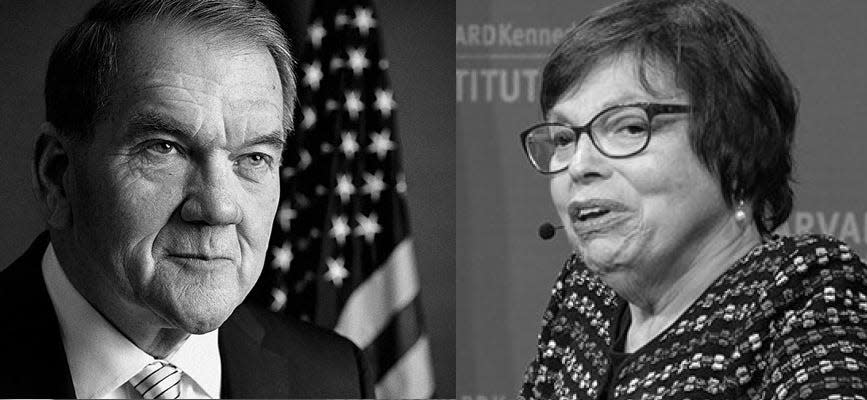Judy Heumann: 'Crip Camp' didn't win Oscar, but it's still a win for people with disabilities
When I attended the Sundance Film Festival last year to watch the documentary “Crip Camp,” I was overwhelmed by people repeatedly asking me the same question.
I am featured in the Oscar-nominated documentary that unspools the story of Camp Jened, a summer camp nestled in the Catskills of New York that became a haven for teenagers and adults with disabilities. I was a camper and later a counselor there.
None of us knew it then, but the camp would become a springboard for activists who would go on to fight for disability rights.
The question at Sundance that kept coming up about the documentary: “How come I didn’t know this story?”
So many groups have their histories known, their successes celebrated, their heroes honored, but we in the disability community have been left behind. We are known yet still very much invisible.
This documentary is changing that. The nomination of “Crip Camp” for best documentary is an indication that an excellent film is getting serious attention in the industry and also in communities around the world.
I am thankful to Michelle and Barack Obama’s Higher Ground Productions and documentary directors Jim LeBrecht and Nicole Newnham, producer Sara Bolder and impact producer Andraea LaVant for telling this story.
Because of “Crip Camp,” people want to learn more about the disability movement and it is enabling those with disabilities from diverse backgrounds to have our voices not only heard but taken more seriously. We demand nothing less.
As the documentary shows, we spent our time at Camp Jened envisioning a world that was not set up in a way that excluded us. We started to have a common vision and ask our own questions, like “Why are we denied an education? Why is there no captioning for deaf people or audio descriptions for blind people and no access to public transportation?”

We came away from the camp knowing we wanted to make changes in society and recognizing lessons from the civil rights movement where people spoke on their own behalf to rectify injustice.
We learned to set the agenda
We realized passivity was not working and charity by others did not emphasize our rights and true wishes. We needed to be the leaders setting the agenda.
The 1960s and 1970s saw the emergence of powerful entities like Camp Jened that prompted an important chapter in our country’s history and fostered decades of activism and advocacy that eventually led to passage of the Americans with Disabilities Act in 1990.
It helped motivate me and others to work as change agents in government and nonprofits. I became an adviser on disability rights for the U.S. Department of State and the World Bank, for example. Many other former campers have gone on to make major contributions to the disability cause.
Most important, our activism has led to increased collaborations among different disability organizations. I was one of the leaders of a sit-in in San Francisco in 1977 demanding that the "504 regulations," which concerned ending discrimination against disabled people from programs that received money from the federal government, be signed unchanged.

The sit-in at a government office lasted nearly a month — the longest sit-in at a federal building — until the 504 regulations were adopted unchanged. It was a huge win.
Disability activism is part of the American saga, representing decades of work by thousands of people for the betterment of millions. We are Black, brown, white, Asian and Indigenous, Muslim, Jewish, Christian, LGBTQ and straight. We are people with visible and invisible disabilities, part of an ever growing community across this country and around the globe. We number more than a billion.
Individuals without disabilities, who many call the temporarily able-bodied, are fearful of acquiring a disability, and so they step back and don’t engage with our issues. Yet, most people will live with a disability at some point in their lives or know someone who will. It is a normal part of life.
COVID-19 shows there's more work to do
People need to stop feeling threatened by the possibility of acquiring a temporary or permanent disability and join our movement to fight for equality and justice for all. This is especially true for people who are now living with a disability because of COVID-19. Similar to my generation at Camp Jened, the pandemic might spark positive activism as scores of people seek to remind the government and others of their rights.
After all, we know what we need, and others should listen when we deliver harsh truths. The disability community has spoken out against congregant living for decades. Now, during COVID-19, we see the terrible consequences of nursing homes and other forms of institutions.
So many people needlessly died in these settings. One of our major issues is demanding that the government create ways for people with disabilities to stay in their homes — where they want to be — by offering increased funding for home- and community-based services.
My hope was that “Crip Camp” would win an Academy Award. But even though we didn't win, we didn't lose.
This film is making more people with disabilities feel empowered and nondisabled people recognize that they not only need to learn more about us, but they also must become part of our fight for equality.
Judy Heumann is a disability rights activist.
You can read diverse opinions from our Board of Contributors and other writers on the Opinion front page, on Twitter @usatodayopinion and in our daily Opinion newsletter. To respond to a column, submit a comment to letters@usatoday.com.
This article originally appeared on USA TODAY: Oscars doc 'Crip Camp' is a victory for disability rights, win or lose

 Yahoo Movies
Yahoo Movies 